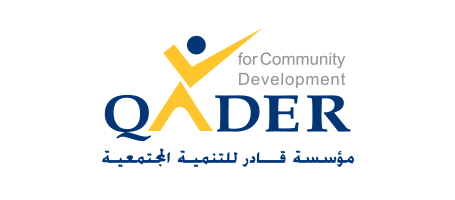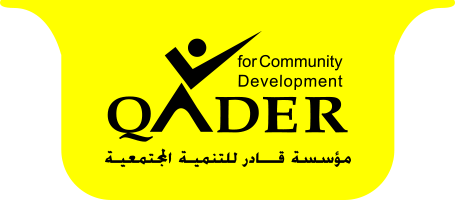Deprived Families, Youth and Women Economic Empowerment Projects (DEEP)
Background:
The ]Deprived Families Economic Empowerment Programme (DEEP), which is implemented by the United Nations Development Program (UNDP) / Program of Assistance to the Palestinian People (PAPP), is concerned with helping families in need and enabling them to become more economically independent and productive instead of being dependent on aid from various parties, by providing them with a package of financial and non-financial services that meet their needs.
The programme adopts a "sustainable livelihood approach" that places people at the center of development. It aims to improve the effectiveness of development programs and projects targeting poor and marginalized groups through a comprehensive analysis that starts with the family and ends with institutions and policies at the national and global level. Thus, the application of the methodology does not make the interventions or programs limited only to the level of the family or community, but extends to include national and global policies that affect poor families.
Sustainable Livelihoods: Families are able to overcome or recover from the pressures, shocks and crises to which they are exposed, and maintain or enhance their human and social capabilities and resources in light of these crises. Sustainability has several dimensions that are all important to the curriculum, which are: flexibility in the face of external pressures and shocks, not relying solely on external support, maintaining the productivity of natural resources in the long term, and not affecting or impeding the livelihoods of others.
Project implementation stages:
- Establishing partnerships with local community organizationss and local authorities in each targeted area to facilitate reaching the poor families
- announcing the opening of receiving applications to benefit from the project through local authorities and local community organizations.
- Preliminary review of the submitted applications based on the standards of UNDP, in the presence of a joint committee from QADER, the local authority, and civil society institutions.
- Discussing the final list of families with UNDP to approve the beneficiaries.
- Conducting field visits to the target families, and giving priority to families on the Ministry of Social Development list.
- Conducting a set of specialized training workshops about bookkeeping, project management, preparation of business plans, and technical training for agricultural projects.
- Studying the business plans developed by the beneficiaries.
- Implementation of economic projects.
I. Deprived Families Economic Empowerment Project - DEEP
QADER implemented the first phase of the economic empowerment project, which targeted deprived and poor families in the Bethlehem area, under the supervision of the Ministry of Social Development and funded by the Islamic Development Bank.
Implementation period:
01/04/2013 – 31/01/2014
Target areas:
Bethlehem: Aida Refugee Camp, Hussan, Al-Ibidiya, Dar Salah.
Beneficiaries:
The project staff visited 68 families in the target areas out of 125 families nominated by the project administration and the Ministry of Social Development. The families were selected based on the criteria set by the empowerment program, and 19 projects were established for 19 families consisting of 120 individuals.The project ideas varied between productive, commercial and service projects according to the available resources. QADER ensured emphasis was made on the empowerment of people with disabilities in this project, as 9 of the families that had been selected had at least one person with a disability.
II. Deprived Families Economic Empowerment Project / Women Entrepreneurs - DEEP WE
QADER implemented the second phase of the economic empowerment project, which targeted women entrepreneurs in Area C, under the supervision of the Ministry of Social Development and funded by the Islamic Development Bank and the Swedish International Development Cooperation Agency (Sida).
Implementation period:
01/02/2014 – 31/12/2014
Target areas:
Hebron Governorate: Idhna and Al-Samou
East Jerusalem: Al-Sawahrah Al-Sharqiyyah, Al-Izariyya, Abu Dis, Al-Sheikh Saad, and Iz’ayyem.
Beneficiaries:
The project staff visited 190 families in the target areas out of 252 families nominated by the project administration and the Ministry of Social Development. The families were selected based on a criteria specified by the Empowerment Program, and 50 projects were established for 50 women. The projects benefited 350 individuals. The project ideas varied between productive, commercial and service projects, depending on the available resources. QADER ensured emphasis was made on the empowerment of women with disabilities in this project, as more than a third of the women beneficiaries have a disability or have a family member with a disability.
III. Deprived Families Economic Empowerment Project / Women Entrepreneurs, Phase Two - DEEP WE II
QADER implemented the third phase of the Economic Empowerment Project, which also targeted women entrepreneurs in Bethlehem and Hebron governorates, under the supervision of the Ministry of Social Development and with funding from the Swedish International Development Cooperation Agency (Sida).
Implementation period:
17/01/2015 – 29/02/2016
Target areas:
Bethlehem Governorate: Al-Khader, Beit Jala, Nahalin, and Battir
Hebron Governorate: Kharas, Surif, Khirbat al-Deir, Beit Ula, and Nuba
Beneficiaries:
The project staff visited all 118 families in the targeted areas that were nominated by the project administration and the Ministry of Social Development. The families were selected based on the criteria set by the Empowerment Program, and 56 projects were established for 56 women, while the total number of individuals benefiting from the project were 341 individuals. The project ideas varied between commercial, agricultural and industrial services, according to the available resources. QADER ensured emphasis was made on the empowerment of women with disabilities, as one third of the women who participated have a disability or have family members with a disability.
IV. Deprived Families Economic Empowerment Project / Youth Entrepreneurs - DEEP YE
QADER implemented the fourth phase of the economic empowerment project, which targeted young men and women from poor families in Bethlehem Governorate, with funding from the Islamic Development Bank under the patronage of the Palestinian Higher Council for Youth and Sports, and supervised by the Ministry of Social Development, and in partnership with Children's Villages International SOS- Palestine Branch.
Implementation period:
15/05/2016 – 31/12/2017
Target areas:
Bethlehem Governorate: Aida refugee camp, Dheisheh refugee camp, Al-Azza refugee camp, Za'tara, Al-Shawawra, Taqou', Housan, Battir, Janata, Kisat, Al Khader, Irtas, Doha.
Hebron Governorate: Sa'ir, Beit Ummar, Halhoul, Hebron, Dura, Beit Ula, Al-Samu', Dhahiriya, the Old City, Surif, Taffuh, Nuba.
Beneficiaries:
The project staff visited all 117 families in the targeted areas that were nominated by the project administration and the Ministry of Social Development. The families were selected based on the criteria set by the empowerment program, and 50 projects were established for 50 beneficiaries. The total beneficiaries of the project were 262 individuals.The project ideas varied between commercial, agricultural and industrial services, according to the available resources. QADER ensured emphasis was made on the empowerment of people with disabilities, as nearly half of the beneficiaries who receive a project have a disability or have a family member with a disability.

